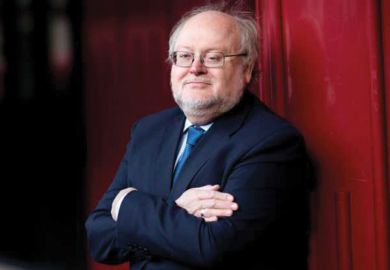Universities should contribute towards the cost of the British Council’s operations to ensure its future sustainability, former universities minister Jo Johnson has suggested, as the Covid-19 crisis takes a severe toll on the organisation’s finances.
The British Council, which plays a key role in supporting UK universities’ international recruitment and wider internationalisation efforts, has furloughed about 18 per cent of its UK workforce, while 157 of its 223 English language test centres and 44 of its 47 teaching centres remain closed in the wake of coronavirus.
The UK government provided the organisation with £26 million of additional funding in April and a £60 million loan this week. But the Public and Commercial Services union, which previously warned that the British Council’s funding gap was £40 million per month, said the new loan only covers its operational costs until mid-August and its long-term future is “still very uncertain”.
The union and the University Council of Modern Languages have launched campaigns to raise awareness of the British Council’s value, while an Early Day Motion calls for the Foreign and Commonwealth Office to “commit to immediate, long-term funding to ensure the continuation of this vital British organisation”.
Mr Johnson, senior fellow at Harvard University’s Kennedy School, professorial fellow at King’s College London and former UK universities and science minister, said that “Britain’s soft power will be hugely important as we redefine our place in the post-Covid world” and “the British Council is a vital part of that”. But he did add that the organisation was “in urgent need of reform to secure its long-term future”.
“Its current model, that sees it use the money it makes from teaching English and delivering exams to support English, education and arts programmes, does not appear to be sustainable,” he said.
Mr Johnson added that as the entirety of the British Council’s FCO funding is Official Development Assistance money, the organisation “increasingly resembles a development agency oriented towards countries on the DAC [Development Assistance Committee] list of eligible countries” and it should be reoriented towards education promotion, with a new co-funding model.
He said that, in addition to the ODA funding, the British Council “should be able to charge a small levy on the international fee income of the educational institutions it serves [in order] to sustain its education promotion work in non-DAC countries”.
“If the higher education sector values its language teaching and testing and promotional work as much as the Universities UK submissions to government suggest, it should be willing to make a proportionate and reasonable contribution towards the cost of its operations. Co-funding by the sector would require a role in governance for UUKi and other sector bodies, which would be helpful on all sides,” he said.
Mr Johnson’s proposals are detailed in a forthcoming paper, Universities Open to the World, which will be published by King’s and Harvard on 15 June. It states that a reformed British Council focused on education promotion should have four core roles: running a new, more ambitious global campaign to promote the UK as a study destination; creating and operating a global student mobility network to replace Erasmus; creating a StudyUK alumni network; and facilitating the recognition of online qualifications.
Janet Ilieva, founder and director of international education consultancy Education Insight and a former employee of the British Council, said that if the organisation were to collapse or even lose its strength it would have a “devastating” impact on the higher education sector, particularly in a post-Covid and post-Brexit world.
“My main worry is that if we see any reduction in the British Council’s presence abroad, given its long-lasting track record, it may actually be read as a signal that the UK is withdrawing from the space of cultural and educational relations, and I think that would be damaging for everybody,” she said.
Claire Gorrara, professor of French studies at the University of Cardiff and chair of the University Council of Modern Languages, said that there is a tendency for the British Council to be seen as an organisation “for nice, rich people who go for a year-abroad experience” − but that “misrepresents what it does”.
“It does an extraordinary amount of public engagement and impact work beyond the university sector…It’s about giving people the option to engage with the world beyond their social and home bubble,” she said, adding that many “underprivileged students” have gone abroad for the first time thanks to the British Council.
A spokeswoman for the council said: “We are grateful to the UK government for this generous loan to help us stabilise. We are starting to open teaching and exams where lockdown easing makes it possible to do so safely, while we continue close discussions with the UK government on plans for the future.
“As the world recovers from the pandemic, making sure the UK is connected, understood and trusted will only be more important. We want to be there doing our part.”
POSTSCRIPT:
Print headline: ‘Universities should come to aid of British Council’
Register to continue
Why register?
- Registration is free and only takes a moment
- Once registered, you can read 3 articles a month
- Sign up for our newsletter
Subscribe
Or subscribe for unlimited access to:
- Unlimited access to news, views, insights & reviews
- Digital editions
- Digital access to THE’s university and college rankings analysis
Already registered or a current subscriber?








